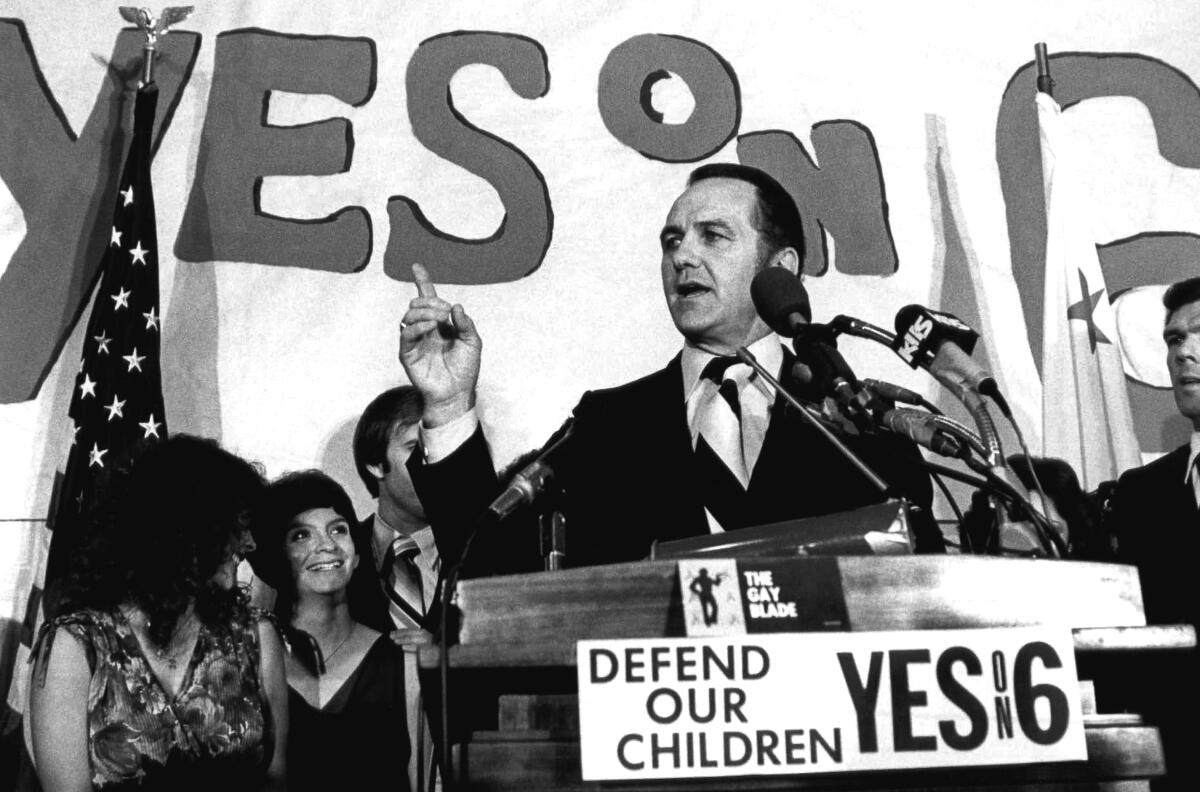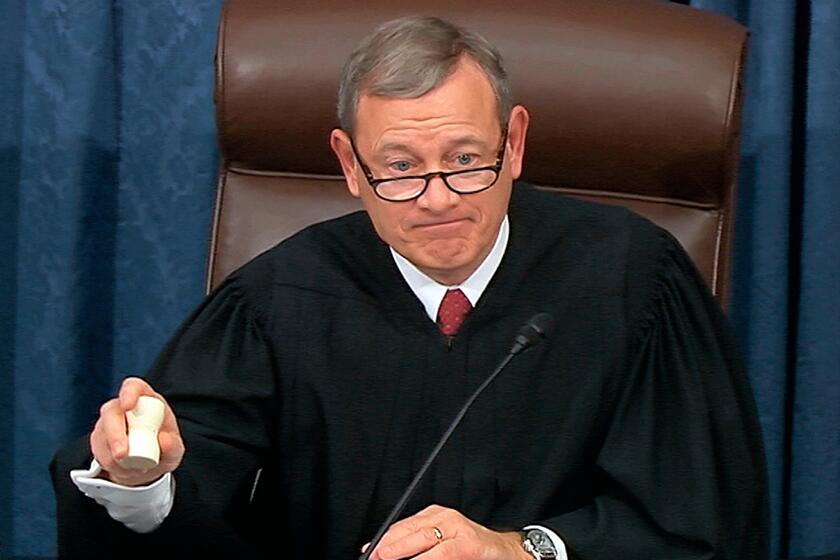Column: How 2.8 million California voters nearly banned gay teachers from public schools

- Share via
Sally Miller Gearhart’s death is a reminder of an era that seems both terribly remote and shockingly recent.
Gearhart was a radical feminist separatist, a communications professor, a Bay Area force of nature, a writer and outspoken gay rights activist. In the 1970s, she published a science-fiction novel about women living apart from men in a rural feminist utopia. In the 1980s, she championed real-life technologies that might allow women to have babies — girl babies — without the meddling of men. “Crackpottery,” this newspaper called it.
Her death last month at age 90 was also a reminder of the state’s epic battle over Proposition 6 — the so-called Briggs Initiative, which I had mostly forgotten about but in which Gearhart played an outsize role. In 1978, Proposition 6 roiled California, pitting the gay rights movement against the state’s moralists and fearmongers.
The brainchild, if you can call it that, of State Sen. John V. Briggs, an Orange County Republican, the initiative would have made it illegal for gays and lesbians to teach in California’s public schools.
Gearhart and Harvey Milk, the San Francisco supervisor assassinated just weeks after the Proposition 6 election, were the co-chairs of the campaign to defeat it.
It was a deranged, fear-fueled crusade on the part of the measure’s proponents. Though it took place only four blink-of-an-eye decades ago, the swirl of hysteria and misinformation suggested something from a previous century. Briggs was inspired to launch the initiative by singer Anita Bryant’s homophobic “Save Our Children” campaign a year earlier in Florida’s Dade County.
The Supreme Court ruled in favor of a Catholic foster care agency in Philadelphia, but not in a way that cleared a path for widespread discrimination.
Why did California need to ban homosexuals from teaching in its schools? Briggs claimed that 20% to 30% of L.A. teachers were gay — and more in San Francisco — and that they were all incipient child molesters. He said homosexuality was worse than communism, because it spread “like a cancer” through society and led to the destruction of civilizations. In an interview with the Los Angeles Times’ Robert Scheer, he claimed that San Francisco’s welfare rolls were growing because homosexuals “tend to have more interest in their sexual activities than in working.”
Like most people don’t?
“Believe it or not,” said Briggs, “right now in California, a teacher can stand up in the classroom and say he is homosexual and introduce his wife, Harry, and not a single thing can be done about it.”
You can write Briggs off as a nut or a Neanderthal, but in fact he represented millions of people in California.
In a televised debate, Gearhart asked Briggs why he wanted to remove homosexuals from schools “when it is more than overwhelmingly true that it is the heterosexual men … that are the child molesters?”
Briggs tried to brush that off as “a myth.”
But Gearhart cited the FBI, the National Council on Family Relations, the Santa Clara County Child Abuse and Sexual Treatment Center, among others.
(Interestingly, Gearhart was cut out of the 2008 film starring Sean Penn as Harvey Milk, and some of her debate lines were apparently rewritten and given to Milk — in a case of what some have described as “lesbian erasure.”)
Briggs died recently too, in April 2020, also at age 90. There’s much heated discussion these days on whether people from earlier eras can be forgiven their backward political views because they were just reflecting what everyone believed in their day. But before cutting Briggs too much slack, remember that he wasn’t just spouting conventional wisdom; he was leading the pack.
In the end, the people of California voted down Proposition 6 by a large majority. Hooray for us. It was probably not the work of Gearhart and Milk that won the day so much as a late-in-the-game statement opposing the ballot measure by a former governor and future president, Ronald Reagan, according to Dudley Clendinen and Adam Nagourney in “Out for Good,” their history of the gay rights movement in America.
“Whatever else it is, homosexuality is not a contagious disease like the measles,” Reagan wrote in a column in the Los Angeles Herald-Examiner just before the election. “Prevailing scientific opinion is that an individual’s sexuality is determined at a very early age and that a child’s teachers do not really influence this.”
To me, it remains shocking that 2.8 million Californians voted for Proposition 6 — 41% of the total votes. Just as 30 years later, millions of Californians — a 52% majority, that time — voted yes on Proposition 8 to ban same-sex marriage. (A federal judge later threw out that reprehensible law.)
It would be nice to think these examples of prejudice and intolerance are now so far behind us that they can be written off as remnants of a bygone unenlightened era. But that’s not so clear.
These days, California performs better on such tests of acceptance and inclusion. A poll conducted by the Public Policy Institute of California in June, for instance, found that 71% of Californians supported the federal Equality Act, which would provide long overdue civil rights protections to LBGTQ Americans and their families. Yet it was depressing that nearly one in four respondents did not support the bill.
Meanwhile, the early battles waged by the likes of John Briggs, Sally Gearhart and others are fading into history.
I did stumble across one recent suggestion of, at the very least, karmic justice. In July, Anita Bryant’s granddaughter said she was planning to wed another woman. She hadn’t yet decided whether to invite her grandmother, who is now 81 years old.
More to Read
A cure for the common opinion
Get thought-provoking perspectives with our weekly newsletter.
You may occasionally receive promotional content from the Los Angeles Times.












